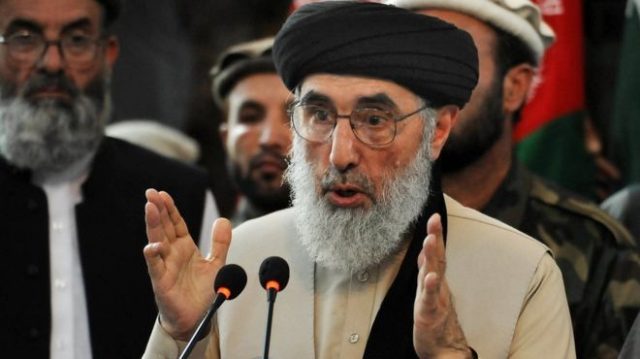News Desk |
Notorious warlord and world-renowned terrorist Gulbuddin Hikmatyar announced his candidacy for the Afghan presidential election on Saturday, presenting President Ghani with yet another challenge upon his return from his Taliban-imposed exile after twenty years. Gulbuddin Hekmatyar led a faction of the mujahedeen against the Russians during the invasion of the 1990s, and until 2016, he remained isolated from Afghan politics.
Hikmatyar announced his decision amidst pledges to restore stability and peace and accused the Ghani-led government of failing to reign in the Taliban. At a news conference held in Kabul, Hekmatyar said, “Our country’s situation requires a powerful central government led by an elected president supported by the majority of people.”
Rashid pointed out the failings of the current commissioners and their inability to lead the Afghan elections, along with citing the major problem of “corruption and fraud”.
This sudden decision is undoubtedly a grave challenge for the already cornered Ghani, and analysts regard it as the warlord’s ploy to politically validate his party, the Hizb-i-Islami.
The Afghan President granted Hikmatyar immunity in 2016 after signing a peace deal; a decision that Washington also accepted. However, Hekmatyar continues to criticize the governance of Ghani, along with the legitimacy of the parliamentary election process back in October. While President Ghani has set his ambitions on a second term, Gulbuddin Hekmatyar is not the only challenger to the throne.
Read more: Afghanistan Election 2018 and Reconciliation process
On Friday, Mohammad Hanif Atmar– former National Directorate of Security (NDS) adviser who bid goodbye to the government back in August– has emerged as the most powerful challenger to Ghani. Atmar has pledged to “save the country” from the maladministration of the Ghani-led government.
Atmar is an addition to the list of names who have formally joined the presidential race, including former chief of intelligence, Rahmatullah Nabil. Zalmai Rassoul, the former foreign minister, who emerged third in the controversial elections of 2014, has also announced his decision to join the race. Lastly, Shaida Abdali, a former diplomatic aide to former President Hamid Karzai, will also be competing in the election.
The July race appears to have pitted Ghani against many of its arch rivals and critics, and the emergence of powerful challengers is revealing the dynamics of shifting loyalties.
Given the deadlock that has emerged in the negotiations between the Taliban and the US diplomatic mission, analysts are entertaining the possibility of a delay in the election. Experts have also noted that the peace negotiations might end up in a settlement that allows the Taliban a role of governance in the future.
The Afghan elections scheduled for July this year are circled with challenges, as Taliban control major areas of the country, security is the greatest concern. Moreover, the challenges and public at large are afraid that fraudulence will undermine the sanctity of the vote, as the 2014 election was widely accused of being “mismanaged” and heavily “rigged”.
Read more: Afghan-style democracy faces test in legislative election
Mohammad Yousef Rashid, the chief executive of the Institute of Free and Fair Election Forum of Afghanistan has commented on the integrity of the Afghan election commission by highlighting the chaotic manner in which Afghan elections are conducted and stressing the need for powerful reforms to avoid a turmoil in July.
Rashid pointed out the failings of the current commissioners and their inability to lead the Afghan elections, along with citing the major problem of “corruption and fraud”. He admitted that the parliamentary election was marked with fraudulence, and said, “If we don’t solve these issues, once again the presidential election will be like a business.”
Read more: Afghan presidential election delayed until July 20
The July race appears to have pitted Ghani against many of its arch rivals and critics, and the emergence of powerful challengers is revealing the dynamics of shifting loyalties. Needless to say, the elections will be a severe challenge for the election commission that has been heavily criticized for its inability to provide Afghanistan a fair and just parliamentary election back in October.
Mina Jahangir with additional input by News Desk.














